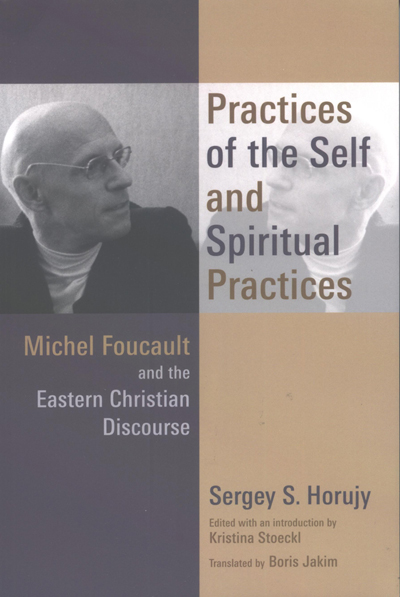 В издательстве Эрдмана вышла книга С.С. Хоружего о Мишеле Фуко “Practices of the Self and Spiritual Practices: Michel Foucault and Eastern Christian Discourse” (на англ. яз.) Презентация книги состоится в Вене.
В издательстве Эрдмана вышла книга С.С. Хоружего о Мишеле Фуко “Practices of the Self and Spiritual Practices: Michel Foucault and Eastern Christian Discourse” (на англ. яз.) Презентация книги состоится в Вене.
…
Книга представляет собой перевод на английский язык части капитального труда С.С. Хоружего, посвященного истории европейской антропологической мысли, вышедшего на русском языке в 2010 г. (“Фонарь Диогена: Критическая ретроспектива европейской антропологии”, М.: Институт св. Фомы, 2010).
Для перевода был выбран раздел о концепции Мишеля Фуко “Последний проект Фуко. Практики себя и духовные практики”.
Книга переведена Борисом Якимом (Boris Jakim) под редакцией Кристины Штёкль. Она же – автор введения “От редактора”.
Книга выпущена издательством Эрдмана (Wm.B.Eerdmans Publishing Co. Grand Rapids/Cambridge, 2015).
ISBN 978—0—8028—7226—5
181 с.
Contents
Editor’s Introduction
Preface to American Edition
Introduction
I. Foucault’sLast Project, or: Hermeneutics by No Means of the Subject
I.1. The Language of Foucault’s New Conception of the Subject
I.2. Sketch of the Conception
I.2.1. Genesis of the Self: The Platonic Model
I.2.2. The Hellenistic, or “Ethical”, Model
I.2.3. The Christian, or “Religious”, Model
I.3. Outline of Foucault’s “General Project” and Discussion of His New Conceptionof the Subject
…
II. Spiritual Practice, Synergic Anthropology, and Foucault’s Project
II.1. Reconstruction of the Hesychast Practice
II.2. From Hesychasm to Synergic Anthropology
II.3. Historical Sequence of Anthropological Formations
II.4. Anthropological Scenarios and Projects for Modernity
III. So Where Shall We Sail?
Bibliography
Index
In this book Sergey Horujy undertakes a novel comparative analysis of Foucault’s theory of practices of the self and the Eastern Orthodox ascetical tradition of Hesychasm, revealing great affinity between these two radical “subject-less” approaches to anthropology. As he facilitates the dialogue between the two, he offers both an original treatment of ascetical and mystical practices and an up-to-date interpretation of Foucault that goes against the grain of mainstream scholarship.
In the second half of the book Horujy transitions from the dialogue with Foucault to his own work of Christian philosophy, rooted in — but not limited to — the Eastern Christian philosophical and theological tradition. Horujy’s thinking exemplifies the postsecular nature of our contemporary period and serves as a powerful invitation to think beyond religious-secular divides in philosophy and Eastern-Western divides in intellectual history.
— Butler University
“The leading expositor of Russian religious philosophy in his generation, Sergey Horujy is also a powerful speculative philosopher in his own right. His highly original synthesis — synergic anthropology — is on clear and full display here. By presenting his vision in dialogue with the thought of Michel Foucault, one of the icons of postmodernism, Horujy demonstrates the continuing vitality of the Russian Orthodox intellectual tradition in our time.”
— Dickinson College
“Horujy is one of the most prolific and well-known philosophers in Russia today. . . . This translation is a superb jumping-off point for readers coming to Horujy’s work for the first time; this particular selection is broadly representative of the style and content of his vast body of erudite work.”
— University of the Basque Country, Vitoria-Gasteiz
“In this thought-provoking book Horujy masterfully stages an unexpected encounter between East and West, Orthodox thought and the philosophy of Michel Foucault. Enriched with Horujy’s original theory of synergic anthropology, this is the beginning of a dialogue to be applauded by anyone who wishes a brighter future for philosophy.”
— University of Chicago
“Sergey Horujy fearlessly traverses conventional disciplines, discourses, and histories in constructing an original religious-philosophical system. . . . The appearance of this work in Boris Jakim’s vibrant translation, with Kristina Stoeckl’s insightful introduction, is a true event not only for readers of Russian philosophy and Orthodox theology but for anyone with an interest in the contemporary life of the mind.”
— Radboud University, Nijmegen, Netherlands
“Exemplifying postsecular philosophical thought and leaving behind a parochial understanding of Russian religious philosophy, Horujy here invites anyone interested in postmodern anthropology to think beyond habitual dichotomies — philosophy/theology, West/East, Latin/Greek, pre-modern/modern. An important step in regauging philosophy for our contemporary age.”



